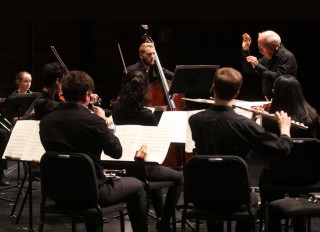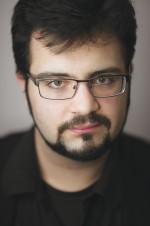Title
Subhead

New Juilliard Ensemble
(Photo by Hiroyuki Ito)The five premieres that the New Juilliard Ensemble will perform on April 10 reflect a broad notion of what makes music American. Two of the composers won N.J.E.’s spring 2014 audition for Juilliard composers—their works will receive world premieres. The other three—two New York premieres and one world—are by other promising artists of various ages.
Body
In response to a question about family backgrounds, Simon Frisch (B.M. ’12, M.M. ’14, composition), the first of two winners of last spring’s composition audition, wrote the following. “My brother and I are the intersection of two strongly identified strands of culture: on my dad’s side, a deeply rooted New York Jewish community with aspirations to high society, on my mother’s side, the rustic agricultural and seafaring Brittany region of France. My Americanness as such is defined very much by displacement, complicated genealogy, and redefinition at each generational level.”
Though Frisch grew up on the Upper West Side, he and his family spent summers in Brittany, where, two years ago, he and the local community founded the Festival Daniou to promote recent American music. His commission is Sandglass Vespers, inspired by a strip of Brittany beach near the shrine of a sixth- or seventh-century saint. “The passing of time is marked only by gentle tolling from St. Suliac’s chapel and periodically by abrupt shifts in the artificially controlled tide, which threatens to leave one stranded,” he wrote in his program note. “Time and tide are etched on sands—the estuary becomes a ‘sandglass,’ or hourglass, but one where sand functions as canvas and not as marker.”
Doctoral student Max Grafe (M.M. ’13, composition), who was born in Poughkeepsie, N.Y., is the second of the two Juilliard composition audition winners. “My mother’s grandparents came from Sicily and my father’s parents came from Dresden,” he told me. “I’m not sure my geographical background has had a whole lot of impact on my music, but my father’s interest in jazz and classic rock has certainly colored my sense of harmony and color.”
Grafe’s Kheir, Fantasy for Clarinet and Sinfonietta, will receive its premiere with soloist Miao Zhao. He explained in his program note that “Kheir is a transliteration of the ancient Greek word for hand, and the root of the English term ‘chiral.’ This describes the potential of certain chemical compounds (such as amino acids) to exist in either of two mirror-symmetrical arrangements, much like a pair of human hands.” He added that while the concept of mirror symmetry has appeared in a lot of his recent work, it’s more central to Kheir’s harmonic and melodic vocabularies, large-scale form, rhythmic gestures, instrumentation, and color palette.
Icarus (2013), which will receive its New York premiere at the concert, is by Eric Lindsay (b. 1980), who holds a doctorate in composition from Indiana University, where he teaches courses in remixing, music and mixed media, and music for film.
Lindsay’s lineage mixes old New England on his mother’s side with more working-class Midwestern roots on his father’s—albeit with roots that trace back to one of the original Scottish clans. Eric’s contrast-filled cultural background—lots of B movies along with far more cultivated pursuits—and “the notion of discrete musical traditions intermingling and/or conflicting is central to my work,” he told me.
In Icarus, Lindsay wrote in his program note, he tried to capture “not only the noise of this increasingly connected world but also the tensions inherent to our constant redefinition of goals and priorities.” The result, he added, “is a collection of earnest, opposing aims—blazing forward while always threatening to rip the whole apart at the seams.”
Born in 1952 and raised in Iran, Reza Vali’s early training was fully Western, first at the Tehran Conservatory, then at Vienna’s Musikhochschule, and finally at the University of Pittsburgh, where he received a Ph.D. in music theory and composition. He’s on the faculty of the Carnegie Mellon School of Music. Western training notwithstanding, Vali started collecting Iranian folk music as a child, and that collection has spawned a cycle of works employing either authentic songs or ones he composes in the folk style, which he calls “‘imaginary folk songs,’ a term borrowed from Bartók.” N.J.E. will give his Folksongs, Set No. 14 (1999) its New York premiere, with second-year master’s countertenor Eric Jurenas as soloist.
While Vali described his musical and compositional life as “a long journey back to Iran,” he acknowledged strong American influences. “Unlike Europe, which still struggles with xenophobia and anti-Semitism (and anti-Islamism), the U.S. allows different cultures to coexist with each other,” he said. “This extraordinary aspect of American society has resulted in the flourishing of the cultures of many people who come from all over the world and call the U.S. their new home. I believe that my works are part of this diverse and multifaceted culture.”
The concert closes with the world premiere of Paul Desenne’s The Life of Benjamin—A Monkey Symphony. A triple citizen (of the U.S., Venezuela, and France) who now splits his time between the Venezuelan jungle and the Boston area, Desenne (b. 1959) was raised in Caracas; his mother is American and his father, French. Though he went to Paris for his last year of high school and studied cello at the Paris Conservatory, Desenne told me, “I feel American as much as I feel Venezuelan and French. This makes things a bit complicated for me, because these cultures are totally different and nothing is absolutely true in these conditions of tri-cultural perspective. But the U.S.A. is also part of our Latin American reality today, and vice versa.” The tension between the cultures is always audible in Desenne’s music, which profits from his thorough French training, his immersion in Afro-Venezuelan traditional music, and his American sense of not being smothered by tradition.
If the reader comes away wondering whether American music isn’t so broad as to be indefinable, one answer comes from American composer Henry Cowell. To him, if music was composed in America, it is American. Quality alone was of primary importance. What distinguished American society and its music, he felt, was our capacity to continually reinvent ourselves.
|
To view the program notes for this performance, click here. |






